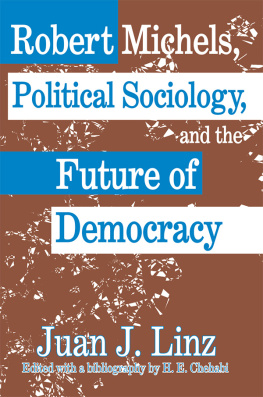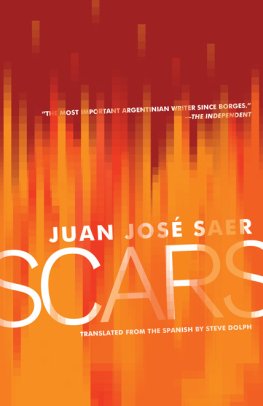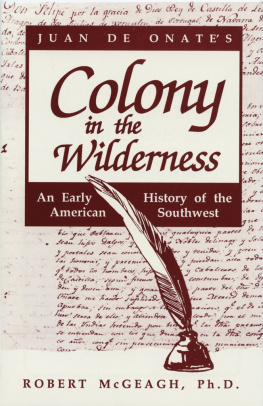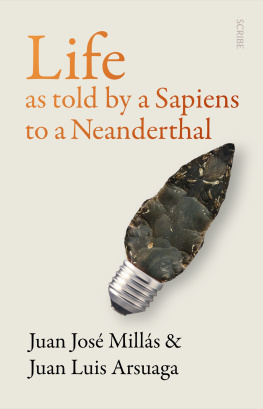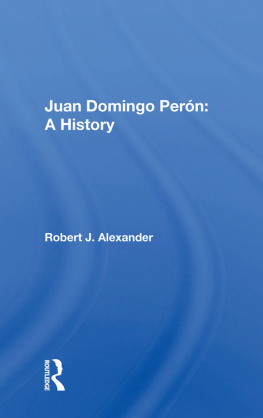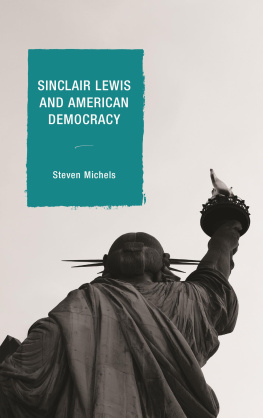Robert Michels, Political Sociology, and the Future of Democracy
Robert Michels, Political Sociology, and the Future of Democracy
Juan J. Linz
Edited with a bibliography by H. E. Chehabi
First published 2006 by Transaction Publishers
Published 2017 by Routledge
2 Park Square, Milton Park, Abingdon, Oxon OX14 4RN
711 Third Avenue, New York, NY 10017, USA
Routledge is an imprint of the Taylor & Francis Group, an informa business
Copyright 2006 by Taylor & Francis.
All rights reserved. No part of this book may be reprinted or reproduced or utilised in any form or by any electronic, mechanical, or other means, now known or hereafter invented, including photocopying and recording, or in any information storage or retrieval system, without permission in writing from the publishers.
Notice:
Product or corporate names may be trademarks or registered trademarks, and are used only for identification and explanation without intent to infringe.
Library of Congress Catalog Number: 2006040448
Library of Congress Cataloging-in-Publication Data
Linz, Juan J. (Juan Jos), 1926-Robert Michels, political sociology, and the future of democracy / Juan J.
Linz ; edited with a bibliography by H. E. Chehabi.
p. cm.
Articles previously published in translation or presented at conferences, between 1966 and 1978.
Includes bibliographical references.
Contents: Robert Michels and his contribution to political sociology in historical and comparative perspectiveTime and regime changeTradition and modernity in SpainFreedom and autonomy of intellectuals and artists / translated from Spanish by H. E. ChehabiA bibliography of Juan J. Linz.
ISBN 0-7658-0338-0 (alk. paper)
1. Political sociology. 2. Michels, Robert, 1876-1936. 3. Social changeSpain. 4. SpainPolitics and government1939-1975. 5. SpainSocial conditions1939-1975. I. Chehabi, H. E. II. Title.
JA76.L54 2006 306.2092dc22 2006040448
ISBN 13: 978-0-7658-0338-2 (hbk)
Contents
Translated from Spanish by H. E. Chehabi
Authors Note
These essays would not have appeared in English without the initiative, commitment, and efforts of my friend, former student, and sometime co-author, Professor Houchang Chehabi. He undertook the task of translating not only one of the essays but the many quotations in different languages dispersed in my English manuscripts, some of which were prepared for publication in Italian. He also looked for the correct references in English and edited the text. The compilation of the bibliography was a painful task which I could never have undertaken myself. I could not be more grateful for his enthusiasm and his efforts.
I also wish to thank my friend Irving Louis Horowitz and Transaction Publishers for their readiness to publish this book at a time that publishers are everyday less ready to take risks for the sake of scholarship.
Editors Preface
This book contains four articles by Juan J. Linz that have been relatively inaccessible. They represent four of Linzs main interests: the classics of sociological theory, comparative politics, Spain, and the role of intellectuals in society.
One of Linzs great merits as a scholar and teacher is his in-depth knowledge of the classics of political sociology. His courses on this topic were popular at both Columbia and Yale, but unfortunately Linz has found time to write only on Robert Michels. The article published here was commissioned by the Italian publisher Il Mulino for a reedition of Michelss classic book on political parties. Linz wrote it in English, but it came out only in Italian translation at the time The version published here has been prepared on the basis of Linzs own English typescript as well as the Italian and Spanish translations.
The next article, Time and Regime Change, was also available only in Italian and Spanish translations until now, although various English versions of it circulated in what Linzs friends and colleagues affectionately call the Linzian underground. The ideas contained in it were first presented in 1976 at the tenth congress of the International Political Science Association in Edinburgh, and the edited Italian version, which I used as the basis for the rewritten version presented here, was published a decade later.
Tradition and Modernity in Spain was first presented at a conference held by the American Academy of Arts and Sciences in 1972. For personal reasons Linz could not meet the publication deadline, and so the proceedings of the conference were published without it. Therefore, this article is more than just a contribution to an understanding of Spanish history: the methodology implicit in it can be of great help to those who try to understand non-Western societies attempts to catch up with the West.
The last article, Freedom and Autonomy of Intellectuals and Artists, is unusual among Juan Linzs writings in that it is an intellectuals think piece. Outside North America scholars are also often public intellectuals, a role Linz has played above all in his native Spain, but also elsewhere: his views on the merits of parliamentary democracy have spawned debate in Latin America, Eastern Europe, and East Asia.
The essay presented here in English translation was first presented at a seminar on the role of intellectuals in society that was held in Madrid in March 1978, when Spains democracy was young. Its relevancy to an American audience is not self-evident, as the United States has few self-defined intellectuals: intellectuals deal with generalities, and Americans have, as Tocqueville pointed out, only limited affinity for general theories and ideas. The ideologically divided sociopolitical milieu that was the background to this essay no longer exists, and few people today would question the role of market forces in shaping cultural production. Linzs thought experiment is not obsolete, however, for the postmodern dystopia that he depicts has been realized in cyberspace, where anybody can say anything and be assured of an audience.
While I have extensively rewritten the four articles, the new versions and my translations of the non-English quotations they contain have been seen and approved by Juan Linz, who has also selectively updated his essays. Finally, I wish to thank Roco de Tern and Jeff Miley, whose help was crucial when the preparation of the manuscript was in its final stages.
H. E. Chehabi
Notes
1. "Michels e il suo contributo alla sociologia politica. Introductory essay to Roberto Michels, La sociologia del partito politico nella democrazia moderna (Bologna: Il Mulino, 1966), pp. viicxix.
2. Juan J. Linz, Michels y su contribucin a la sociologa poltica, trans. Eduardo L. Surez (Mexico: Fondo de Cultura Econmica, 1998).
3. "Il fattore tempo nei mutamenti di regime in Teoria politica 2 (1986): 3-47. This was followed by a Spanish translation done in Mexico: Juan J. Linz, El factor tiempo en un cambio de rgimen, trans. Ariella Aureli (Mexico: Instituto de Estudios para la Transicin Democrtica, 1994).
4. Yossi Shain, Juan J. Linz et al., Between States: Interim Governments and Democratic Transitions (Cambridge: Cambridge University Press, 1995). Another essay that grew out of this piece is Juan J. Linz, Democracys Time Constraints, International Political Science Review


